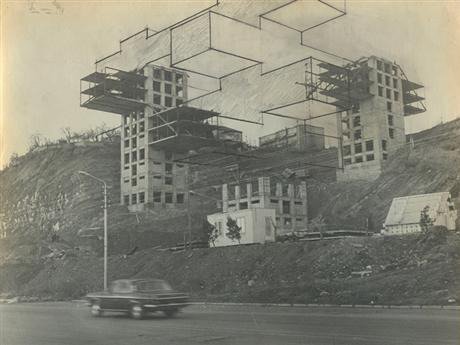Trespassing Modernities
dal 7/5/2013 al 10/8/2013
Segnalato da
7/5/2013
Trespassing Modernities
Salt Galata, Istanbul
Almost 25 years after the corrosion of the Soviet Union, still little is known, beyond the former Empire's borders, about the social fabric that wove it together. The exhibition explores this landscape and an approach of building for a fundamentally different idea of society.

Trespassing Modernities exhibition by SALT will reveal the legacy of modern
architecture in the former Soviet Union. Examples of exceptional practices by
local architects working in the 1960s and 1970s followed by the crticial
approach of the Paper Architecture movement in the 1980s are brought
together from the 15 countries that once made up the Union.
Installed throughout SALT Galata, the selection of scale models, drawings,
photographs, films and ephemera that portray post-war life in the USSR will
be on view
from May 8 through August 11 with support by Kalebodur.
Almost 25 years after the corrosion
of the Soviet Union, still little is
known, beyond the former Empire’s
borders, about the social fabric that
wove it together. Architecture and
urbanism have been one of its
strongest warps: creating a feeling
of social unity and being one of the
agents of its dissolution. This
continent of architecture, afflicted
by inner contradictions that
enfolded within an homogenized
space, is full of masterpieces
waiting to be formally discovered.
Trespassing Modernities explores
this landscape and an approach of
building for a fundamentally
different idea of society.
All started in the thaw period of the
Khrushchev years after Stalin’s
death in 1953. The new ideological
call for modernization of the
country led to an enormous
extension of urban space. This
continued into the final years of the
USSR as economical crisis and
dwindling material resources took
their toll. The master architecture
of Socialist Realism was rejected. A
new urbanization was driven by an
ideology of scientific and
technological progress. It was
conceived by local planning offices
in each republic and executed to
the standardizations of the
construction industry. Architects
experimented with concepts of
international architecture and the
legacy of Soviet Modernism of the
1920s. Rapidly an original Soviet
language of Late Modernism
developed.
But already in the 1960s a critical
countermove to this policy of
industrialization of space and
architecture arose. It took the
historical old town as a point of
reference. Architects and local
elites understood their distance to
the official canon of architecture as
being a confirmation of their
regional – or national – search for
identity. Thus an architectural
avant-garde, that defied the
dominant politics of the central
Moscow bureaucracy, was able to
form in the republics. Both versions
of modernism – the local modern
and the Soviet-hybrid – reflected
differently positioned modern
lifestyles.
Trespassing Modernities is
dedicated to the legacy of post-war
Soviet architecture: to its masters
and its specificities, its original
styles and erratic buildings. It aims
to offer a glance at a still existing
void in the canonical history of
architecture.
Trespassing Modernities is programmed for SALT by Georg Schöllhammer
with Ruben Arevshatyan. The exhibition is based on the research of Local
Modernities, a project by Georg Schöllhammer, Ruben Arevshatyan, Klaus
Ronneberger, Markus Weisbeck and Heike Ander, which initiated the
exhibition Soviet Modernism 1955-1991 Unknown Stories (2012) by
Architekturzentrum Wien.
Georg Schöllhammer is an editor, writer and curator based in Vienna. He is founding
editor of springerin and head of tranzit.at. He has worked internationally on cultural
projects including dOCUMENTA, Manifesta, L’internationale, Former West and Sweet
60s.
The digital database of “Soviet Modernism 1955-1991” of buildings in the former
Soviet republics (not including Russia) is kindly made available by
Architekturzentrum Wien for browsing in the exhibition.
Supported by Kalebodur.
Press contact:
Zeynep Akan +90 2123342245 press@saltonline.org
SALT Galata
Bankalar Caddesi 11 - Karaköy 34420 İstanbul Türkiye
Tuesday-Saturday: 10.00-18.00
Wednesday 12.00-20.00
SALT is free



